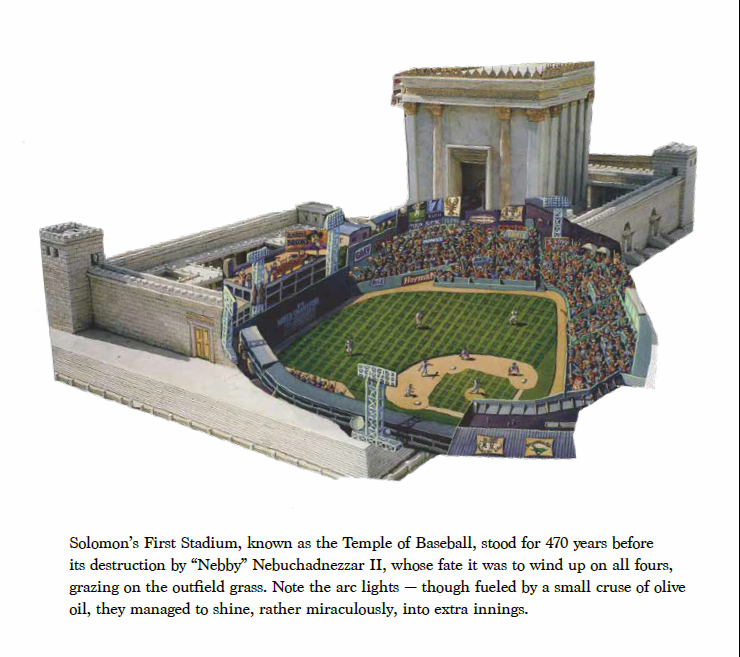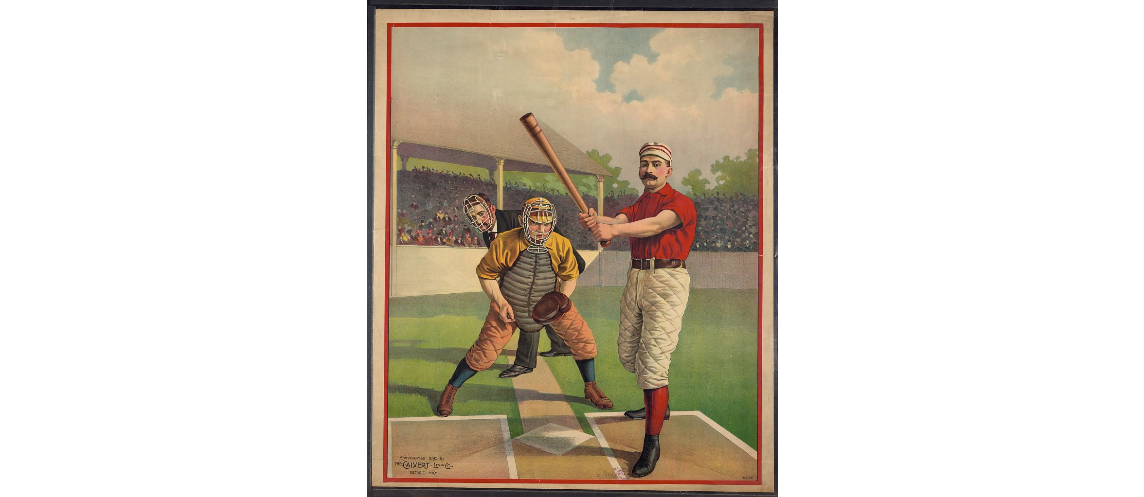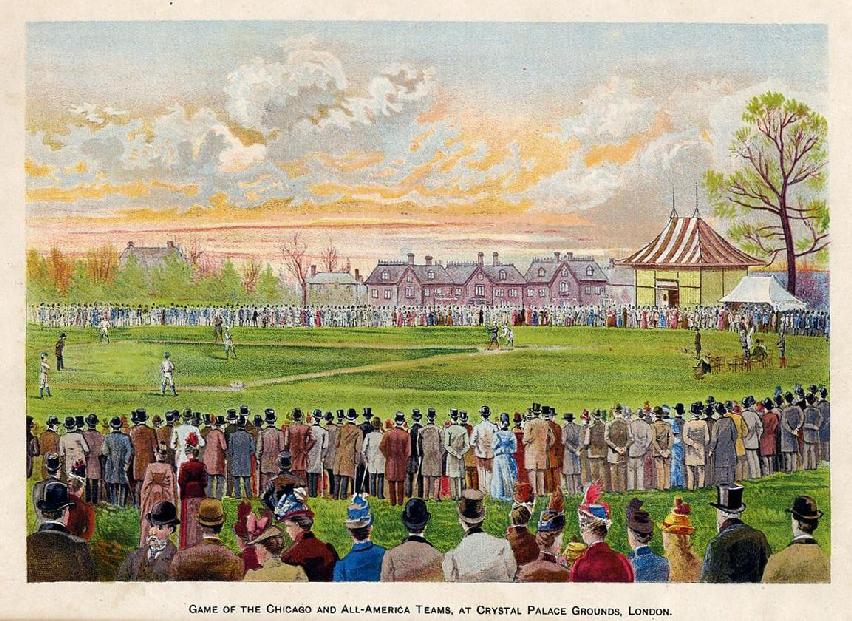
It looked, well, all farcockteh for the Putzville nine that day;
The score — don’t ask — was 4 to 2. You heppy now? Hokeh.
And so when Plotkin plotzed at first, and Schwartz popped up to third,
Already y’hay sh’may rab-boh was in the ballpark heard.
A couple shlumps got up to go, the others shrugged, and stayed
(For box seats on the field, hoo boy! their tuchuses they paid);
They thought, If only Kessler maybe gives the ball a zetz,
We’d shimmy through the shtetl and forget about the Mets!
But Stein preceded Kessler, as did his nephew, Moe,
And Stein a real shmegegee was, and Moe was just a shmo;
So maybe now for Kessler they should bother not to wait —
Moshiach had a better chance of schlepping to the plate.
But Stein, he blooped a bingle, and his mother cried, Mein Gott!
And Moshe clubbed a double, I should drop dead on the spot;
And when they finished running and bent wheezing at the waist,
There was Moe verklempt on second and Stein on third, vershtast?
So now from all those Putzville fans was such a big to-do,
They rose and davened in a wave, a hundred shofars blew;
A host of angels wept to hear a thousand chazzans sing,
For Kessler, Rebbe Kessler, he was coming up to swing.
There was schmaltz on Kessler’s tallis as he stepped into the box,
In his beard were crumbs of matzoh, small piece cheese, a bissel lox,
And when he shook his shtreimel, drenching half the fans with sweat,
No goyim in the crowd could doubt — ’twas Kessler at the bet.

And now the mystic, Kabbalistic pitch comes floating in,
And Kessler’s brow is furrowed, and he slowly strokes his chin;
He comprehends that long before Creation had begun,
This pitch existed somewhere . . . but then he hears, “Strike vun!”
From the stands (donated by the Steins) the whole mishpocheh moaned,
A yenta started kvetching and a balabusta groaned;
“Hey, ump!” an angry moyel cried, “I’ll cut you like a fish!”
So, nu? They would have cut him, but Kessler muttered, “Pish!”
With a smile of pure rachmanis, great Kessler’s punim shone,
He stilled the boiling moyel, he bade the game go on;
He yubba-dubba-dubba’ed as the pious pitcher threw,
But he yubba-dubba’ed once too much — the umpire shrugged,
“Vot? It’s not for you good enough? Strike two!”
“Feh!” cried the maddened Hasids, and Elijah echoed, “Feh!”
But a puzzled look from Kessler made the audience go, “Heh?”
They saw his payus rise and fall, they saw his tzitzits twitch,
They knew that Rebbe Kessler vouldn’t miss another pitch.
The smile on Kessler’s punim now is more profound, and keener;
He glows with all the preternatural light of the Shekinah;
And now the pishka-pishka pitch so big and fat it gets;
And now the air is shattered by the force of Kessler’s zetz!

"Tevye at the Bat" (see note below) attributed to John Alcorn. Image courtesy of John Thorn.
Oy. Somewhere in Jerusalem a grandson plants a tree;
A klezmer band is playing — so, the clarinet’s off-key;
And somewhere else a shmoyger with the rebbetzin has flirted;
But there is no joy in Putzville — mighty Kessler has converted.
(“The name is Kelly, if you don’t mind!”)
Regarding the image "Tevye at the Bat," John Thorn writes:
Tevye at the Bat. Drawn for American Heritage magazine (undated) but seemingly unpublished; I am pretty confident about my identification of the artist as John Alcorn, who worked with Milton Glaser and Seymour Chwast at Push Pin Studios. (I own it.)
Cover Art: "Solomon's First Stadium," from Ancient Baseball, by Mikhail Horowitz. The ALTE (Getting Old Together) blog writes
In thirty-six magnificent color pages, Mikhail Horowitz unveils the roots of baseball throughout human history and before, from paleolithic days through to Ancient Greece, Ancient China, Ancient Africa, etc. With all those Ancients, it's the perfect book for ALTE readers.
Seriously, this is one of the most classy and uproarious books ever. John Thorn, the official historian of Major League Baseball, calls ANCIENT BASEBALL "gorgeous, erudite, laugh-out-loud funny.” If you're a baseball fan, it's a must-have, and even if you don't know balls from strikes, you'll find it very entertaining.
Caseyatthe.blog adds:
What, am I the schmuck who for the goyim has to translate this masterpiece? Well, I suppose I am. So pay attention, because not only will you learn some great new words, but you'll understand why "Kessler at the Bat" is such an epic send-up of the original "Casey":
Stanza 1:
Putzville: Well, for this to be funny, you need to know that "putz" is pretty much the same as "schmuck," though I stand to be corrected on this. If you surmise that the Putzville population consisted primarily of schmucks, schlumps, schlemiels, and schlemazils (see below) you would be pretty much in the ballpark.
farcockteh (also known as "verkackte"): screwed-up, or literally "becrapped"
plotz: to burst (as from emotion)
"y'hay sh'may rab-boh:" the key phrase of traditional prayer, the Kaddish
Stanza 2:
shlump or schlump: slow, slovenly, or inept person (perhaps kind of a schmuck or even a schmo (an ordinary person, as in "Joe Schmo"). As for schlemiels and schlemazils, an accepted definition designates the schlemiel as the guy who spills his soup, and the schlemazil as the guy the soup lands on.
tucheses (from tuchas, or tuchis), backside, ass
zetz: a blow, punch, or slam
shtetl: town or village, as for example, Anatevka in Fiddler on the Roof
Stanza 3:
schmegegee: the best I can come up with is, a guy full of hot air or baloney, a faker
shmo: (see "shlump" above)
Moshiach: the Jewish Messiah
schlepping (maybe not so much from the verb schlepp as from the noun) Seriously, do you not know this is in English the same? Go look it up, already. OK, the noun form of schlepp is a "tedious, difficult journey."
Stanza 4:
bingle: Hey, do you not know the American baseball slang for a base hit?
verklempt: choked up, speechless
verstasht: (from the verb verstehen, to understand): actually the best translation is to the Italian dialect capisce (capish, capiche), you get it?
Stanza 5:
davened: (from the verb, daven) recited the prescribed liturgical prayers
shofar: seriously, if you have never heard the shofars blowing, go look it up on YouTube already!
chazzans: the cantor or chazzan recites and leads the prayers in synagogue
Stanza 6:
schmaltz: traditionally, chicken or goose fat
bissel: a little bit
shtreimel: traditional fur hat worn by male Hasidim
Stanza 7:
Kabbalistic: from the Kabbalah, a method of mystic exploration of the essence of God
Stanza 8:
mishpocheh: the family
yenta: a gossip, or talkative woman
balabusta: a good homemaker--NOT (as far as I can determine) the obscure origin of the slang "ball-buster"
moyel: (or mohel) a person who performs the ritual male circumcision
Stanza 9:
rachmanis: mercy, or pity (In the original, Great Casey's visage shone with "Christian charity")
punim: face (visage)
yubba-dubba: I will have to be schooled on this verb; I can only think of Fred Flintstone's exclamation of joy, which I believe was yabba-dabba-doo!
Stanza 10:
payus: from "payos," the sidelocks, sidecurls, or earlocks worn by Orthodox Jews
tzitzits: tassels worn on ceremonial garments
Stanza 11:
Shekinah: the "dwelling" or "settling" of God, wherein is the manifestation of God's glory
pishka-pishka: the definition of "tin can," or "alms box," probably relates to the sound the object makes when shaken
Stanza 12:
klezmer band: Oh, come on. You've heard a klezmer band, already! If not, go to YouTube and look up "shofar" while you're at it.
shmoyger: a fool
rebbetzin: the Rebbe's wife. At this point, Horowitz strikes a note (echoing the off-key clarinet, above) intimating domestic discord within the Rebbe's own household....
"The name is Kelly...": The sole and final utterance of the mighty Kessler is to insist that he now be known as "Kelly." As students of "Casey" and scholars of baseball are aware, Mike "King" Kelly (1857-1894), one of the most accomplished and famous players of his day (and certainly the best paid), annoyed Ernest Thayer with his claim to be identified as the prototype for the protagonist of Thayer's ballad. Thayer believed that Kelly claimed to have authored "Casey," but in fact Kelly only performed it (with indifferent success) on music hall stages of the era.

Mike "King" Kelly. Playing on teams in Cincinnati, Chicago, Boston, and New York during his career from 1878 to 1893, Kelly was elected to the Baseball Hall of Fame in 1945.
And a final note from Caseyatthe.blog: my favorite word brilliantly opens the final stanza--"Oy." That simple, unexclamated "Oy" brings the entire saga of Kessler's life-changing at-bat (and by extension, that of Casey himself) down to a simple utterance of exasperation--or dismay. Look what this has all come to. What a mess. Oy. It is hard to improve on Thayer's exalted vocabulary and phrasing, but this unadorned "Oy" demonstrates that there are few works of poetry or prose that cannot be improved by simple redaction.



Leave a comment
This site is protected by hCaptcha and the hCaptcha Privacy Policy and Terms of Service apply.